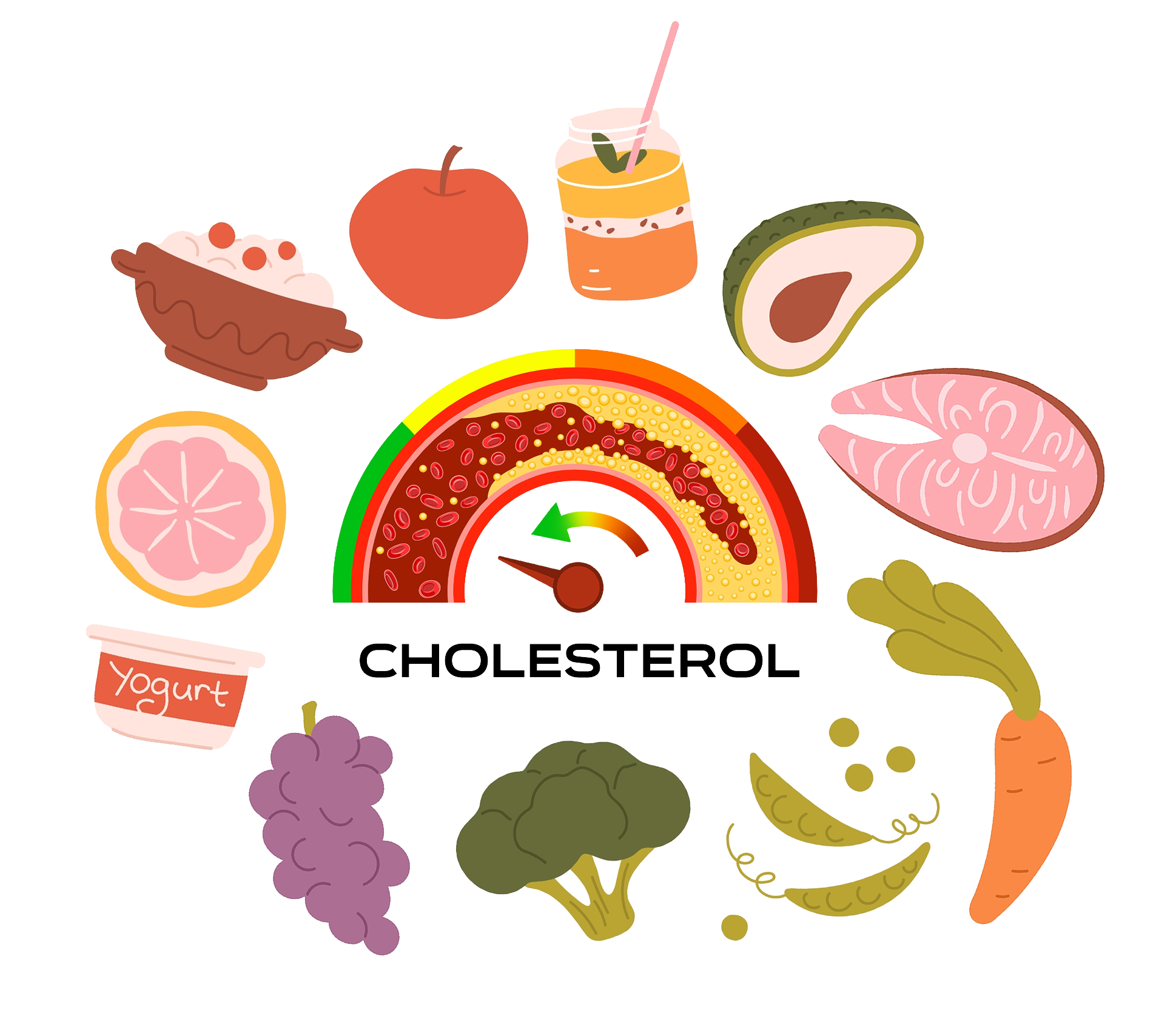Changes in overall diet and supplementation or replacement of certain foods may reduce cholesterol, in particular total cholesterol and low-density lipoprotein cholesterol (LDL-C). The 2002 Adult Treatment Panel III (ATPIII) report by the National Heart, Lung, and Blood Institute of the National Institutes of Health (NIH) placed emphasis on “nutrition and physical activity for cholesterol management and overall risk reduction” and created the Therapeutic Lifestyle Changes approach for reducing coronary heart disease risk.1 This included a recommendation to increase viscous (soluble) fiber and plant stanols and sterols (isolated from soybean and tall pine-tree oils). For example, adding 5 – 10 g a day of viscous fiber to a person’s diet results in about a 3 – 5% reduction in LDL-C and a 2 g a day increase of plant sterol or sterol esters results in a reduction of 6 – 15% of LDL-C. Sources of soluble fiber include barley, oats, apples, bananas, berries, citrus fruits, nectarines, peaches, pears, plums, prunes, broccoli, brussels sprouts, carrots, dry beans, peas, and soy products (such as tofu and miso). Plant sterols and stanols are found in vegetable oils, margarines, seeds, nuts, grains, vegetables, legumes, and fruits.2 The Food and Drug Administration has also authorized several health claims that support that certain foods and nutrients may reduce the risk of heart disease by lowering cholesterol,3 including whole oats or high soluble fiber foods,4 soy protein,5 plant sterols and stanols,6 and fruits, vegetables, and grain products that contain fiber.7
Diets that May Lower Cholesterol
Diets such as the Mediterranean diet (MD), Dietary Approaches to Stop Hypertension (DASH), vegetarian and vegan diets have been evaluated for their cholesterol-lowering effects.8-13 These diets are all heavy in foods that are high in soluble fiber and plant stanols and sterols.
In addition to reducing overall cardiovascular risk and mortality,14-16 the Mediterranean diet can reduce cholesterol. Compared to the Healthy US-Style eating pattern, the Mediterranean-style contains more fruits and seafood and less dairy.1 It includes vegetables, fruits, nuts, seeds, legumes, potatoes, whole grains, breads, herbs, spices, fish, seafood, and extra virgin olive oil. Poultry, eggs, cheese, and yogurt should be consumed in moderation. Foods such as red meats, processed meats (sausages, hot dogs, hamburgers, salami, bologna, ground beef), pizza, and chips should be limited. A 2011 meta-analysis of six randomized trials with 1 to 2 years follow-up compared the Mediterranean diet to a low-fat diet in 2,650 individuals who were mostly overweight or obese with cardiovascular disease risk factors such as hypertension, dyslipidemia, diabetes and smoking.11The Mediterranean diet, lowered total cholesterol by 7.4 mg/dL (95% confidence interval [CI] [-10.3 – -4.4]) compared to a low-fat diet. However, decreases in LDL-C of 3.34 mg/dL (95% CI [-7.27 – 0.58].p=0.3, I2=23% ) and increases in HDL-C of 0.9 mg/dL (95% CI [-1.9 – 3.8], p<0.001, I2=99%) were not statistically significant.
The DASH diet, originally developed for people with hypertension, is rich in fruits, vegetables, fiber, and low-fat dairy products, and limits animal protein, saturated fat, and added sugars.17 In a large randomized controlled outpatient feeding trial comparing the DASH diet with a control diet for eight weeks in 436 healthy participants, there was an overall reduction in total cholesterol of 13.7 mg/dL, LDL-C of 10.7 mg/dL, and high-density lipoprotein (HDL) cholesterol of 3.7 mg/dL, all p< 0.0001.12 There were greater reductions in total and LDL-C in men than women (10.3 mg/dL, p=0.052 and 11.2 mg/dL, p<0.02, respectively). There were no significant differences by race or baseline lipid levels. The DASH diet also lowered LDL-C in a trial of 31 adults with type 2 diabetes by 17.2 ± 3.5 mg/dL (p=0.02).8 Modified versions of the DASH diet have also been evaluated for differences in effectiveness in lowering lipid concentrations.9,13 In a 2016 randomized three-diet (control, DASH, and high-fat, low-carbohydrate DASH [HF-DASH]) crossover trial in 36 healthy individuals, both DASH and HF-DASH lowered total (-9.67 ± 2.32 mg/dL, p=0.004 and -8.89 ± 2.32 mg/dL, p=0.008, respectively) and LDL cholesterol (-8.12 ± 2.32 mg/dL, p=0.007 and -6.19 ± 2.32 mg/dL, p=0.04, respectively) compared to the control diet.9 Appel et al. further modified the DASH diet to replace some carbohydrate with protein or unsaturated fat.13 This crossover trial of 164 participants with prehypertension or stage 1 hypertension showed that the protein-replaced DASH diet further lowered LDL-C (-3.3 mg/dL, p=0.01), HDL-C (-1.3 mg/dL, p=0.02) and trigylcerides (-15.7 mg/dL, p<0.001). The unsaturated fat-replaced DASH diet increased HDL-C (+1.1 mg/dL, p<0.03) and lowered triglycerides (-9.6 mg/dL, p=0.02).
There have also been multiple studies citing the advantages of a vegetarian or vegan diet. In a systematic review with meta-analysis of case control studies comparing the vegetarian diet to an omnivore diet, there was an association of lower total cholesterol (-28.16 mg/dL, 95% CI [-31.22 – -25.10], p<0.001, n=64 studies), LDL cholesterol (-21.27 mg/dL, 95% CI [-24.27 – -18.27], p<0.001, n=46 studies), HDL cholesterol (-2.72 mg/dL, 95% CI [-3.40 – -2.04], p<0.001, n=51 studies), and triglycerides (-5.08 mg/dL, 95% CI [-5.98 – -4.19], p=0.02, n=55 studies).18 For the vegan diet, there was also an association of lower total cholesterol (-31.02 mg/dL, 95% CI [-34.82 – -27.21], p<0.001, n=19 studies) and LDL cholesterol (-22.87 mg/dL, 95% CI [-29.92 – -15.82], p<0.001, n=13 studies).
References
- Third Report of the National Cholesterol Education Program (NCEP) Expert Panel on Detection, Evaluation, and Treatment of High Blood Cholesterol in Adults (Adult Treatment Panel III) final report. Circulation 2002; 106 (25): 3143-3421.
- Trautwein EA, Vermeer MA, Hiemstra H, et al. LDL-Cholesterol Lowering of Plant Sterols and Stanols-Which Factors Influence Their Efficacy? Nutrients 2018; 10 (9).
- Health claims: Dietary saturated fat and cholesterol and risk of coronary heart disease. 21 CFR §101.75. 2016; https://ecfr.federalregister.gov/current/title-21/chapter-I/subchapter-B/part-101/subpart-E/section-101.75. Accessed January 13, 2020.
- Health claims: Soluble fiber from certain foods and risk of coronary heart disease (CHD). 21 CFR §101.81. 2016; https://ecfr.federalregister.gov/current/title-21/chapter-I/subchapter-B/part-101/subpart-E#section-101.81. Accessed January 13, 2020.
- Health claims: Soy protein and risk of coronary heart disease (CHD). 21 CFR §101.82. 1999; https://ecfr.federalregister.gov/current/title-21/chapter-I/subchapter-B/part-101/subpart-E/section-101.75. Accessed January 13, 2020.
- Health claims: plant sterol/stanol esters and risk of coronary heart disease (CHD). 21 CFR §101.83. 2005; https://ecfr.federalregister.gov/current/title-21/chapter-I/subchapter-B/part-101/subpart-E#section-101.83. Accessed January 13, 2020.
- Health claims: fruits, vegetables, and grain products that contain fiber, particularly soluble fiber, and risk of coronary heart disease. 21 CFR §101.77. 1993; https://ecfr.federalregister.gov/current/title-21/chapter-I/subchapter-B/part-101/subpart-E#section-101.77. Accessed January 13, 2020.
- Azadbakht L, Fard NR, Karimi M, et al. Effects of the Dietary Approaches to Stop Hypertension (DASH) eating plan on cardiovascular risks among type 2 diabetic patients: a randomized crossover clinical trial. Diabetes Care 2011; 34 (1): 55-57.
- Chiu S, Bergeron N, Williams PT, et al. Comparison of the DASH (Dietary Approaches to Stop Hypertension) diet and a higher-fat DASH diet on blood pressure and lipids and lipoproteins: a randomized controlled trial. Am J Clin Nutr 2016; 103 (2): 341-347.
- Crawford MH. Vegetarian diet vs. Mediterranean diet to reduce cardiovascular risk. Clinical Cardiology Alert 2018; 37 (6).
- Nordmann AJ, Suter-Zimmermann K, Bucher HC, et al. Meta-analysis comparing Mediterranean to low-fat diets for modification of cardiovascular risk factors. Am J Med 2011; 124 (9): 841-851.e842.
- Obarzanek E, Sacks FM, Vollmer WM, et al. Effects on blood lipids of a blood pressure-lowering diet: the Dietary Approaches to Stop Hypertension (DASH) Trial. Am J Clin Nutr 2001; 74 (1): 80-89.
- Appel LJ, Sacks FM, Carey VJ, et al. Effects of protein, monounsaturated fat, and carbohydrate intake on blood pressure and serum lipids: results of the OmniHeart randomized trial. JAMA 2005; 294 (19): 2455-2464.
- de Lorgeril M, Salen P, Martin JL, et al. Mediterranean diet, traditional risk factors, and the rate of cardiovascular complications after myocardial infarction: final report of the Lyon Diet Heart Study. Circulation 1999; 99 (6): 779-785.
- Martínez-González MA, Salas-Salvadó J, Estruch R, et al. Benefits of the Mediterranean Diet: Insights From the PREDIMED Study. Prog Cardiovasc Dis 2015; 58 (1): 50-60.
- Widmer RJ, Flammer AJ, Lerman LO, et al. The Mediterranean diet, its components, and cardiovascular disease. Am J Med 2015; 128 (3): 229-238.
- Sacks FM, Appel LJ, Moore TJ, et al. A dietary approach to prevent hypertension: a review of the Dietary Approaches to Stop Hypertension (DASH) Study. Clin Cardiol 1999; 22 (7 Suppl): Iii6-10.
- Dinu M, Abbate R, Gensini GF, et al. Vegetarian, vegan diets and multiple health outcomes: A systematic review with meta-analysis of observational studies. Crit Rev Food Sci Nutr 2017; 57 (17): 3640-3649.

.png)


